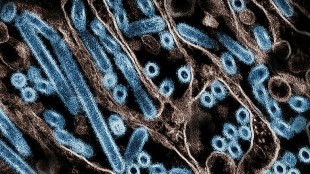

China health chief tells public not to touch foreigners after first monkeypox case
A top Chinese health official has warned the public to avoid "skin-to-skin contact with foreigners" to prevent the spread of monkeypox after the country confirmed its first case.
China recorded the infection on Friday in a person who had recently arrived from overseas and is in quarantine, health officials had said earlier.
"To prevent possible monkeypox infection and as part of our healthy lifestyle, it is recommended that 1) you do not have direct skin-to-skin contact with foreigners," Wu Zunyou, chief epidemiologist at the Chinese Center for Disease Control and Prevention, wrote in a post on his official twitter-like Weibo account on Saturday.
Wu also called for people to avoid skin-to-skin contact with people who had been abroad within the past three weeks as well as all "strangers".
He said China's strict Covid-19 restrictions and tight border controls had so far prevented the spread of monkeypox, and cautioned against allowing cases to "slip through the net".
His post was widely shared across different Chinese social media platforms over the weekend, but the comments section under the initial post was disabled.
Some who commented on forwarded versions or screenshots of his post were concerned Wu's guidelines could lead to xenophobia and drew parallels to the violence Asian people overseas faced at the start of the Covid-19 pandemic due to the association of the virus with people of Chinese heritage.
Several pointed out that there were foreign workers and long-time residents in China who have not left the country due to Covid restrictions.
"Did someone jump and scream discrimination?" wrote one commentator.
"Does he know that many foreigners have been staying in China for years?" another said.
Under China's zero-Covid policy, people entering the country must typically complete between one and two weeks of isolation on arrival.
The patient identified with monkeypox in the southwestern city of Chongqing had been "immediately isolated" upon entering the city and "there are no traces of social transmission, and the risk of transmission is low", local health officials had said earlier.
Monkeypox causes painful skin lesions and flu-like symptoms.
Historically, the virus has spread via direct contact with lesions, body fluids and respiratory droplets, and sometimes through indirect contamination via surfaces such as shared bedding.
But in this outbreak, there is preliminary evidence that sexual transmission may also play a role.
The World Health Organization declared a global health emergency in July after monkeypox, which is related to the eradicated smallpox virus, had spread to dozens of countries where it was not previously found.
More than 50,000 cases and 16 deaths have been reported to the WHO since the outbreak began, WHO chief Tedros Adhanom Ghebreyesus said earlier this month.
(C.Fontaine--LPdF)




